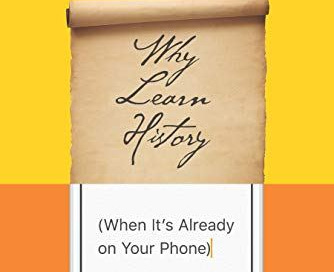‘Why Learn History When It’s Already On Your Phone?’
History courses should teach students to build arguments
Sam Wineburg, Professor of Education and History at Stanford University, asks that question in the title of his 2018 book.
“We definitely can’t stick to the same old read-the-chapter-answer-the-questions-at-the-back snoozefest we’ve subjected students to for decades,” he writes. “If we want to educate citizens who can sift through the mass of information around them and separate fact from fake, we have to explicitly work to give them the necessary critical thinking tools.”
Historical thinking, he argues, “has nothing to do with test prep–style ability to memorize facts. Instead, it’s an orientation to the world that we can cultivate, one that encourages reasoned skepticism, discourages haste, and counters our tendency to confirm our biases.”
For more than 100 years, high school students have done poorly on standardized history tests; journalists, politicians and educators have deplored the results, that we are raising a nation of boobs and ignoramuses. Wineburg argues that we are testing the wrong things. He agrees with E.D. Hirsch, author of a series of books on “cultural literacy” that history provides a framework for understanding the world; without it the world is unintelligible and the daily news makes no sense. Instead of memorizing names and dates and then forgetting them, students should learn why history really matters. It should teach skills.
Students should learn to build arguments, as he explained in an article for the Library of Congress website. “But, you may ask, if history has already happened, what’s there to argue about? Plenty. Was the American Revolution a fight against tyranny or an attempt by the well bred to maintain their social status? Was the Cold War really a conflict of democracy versus communism or a struggle between two superpowers for dominance?”
Keep reading with a 7-day free trial
Subscribe to Slender Threads / Global Citizens / Public History to keep reading this post and get 7 days of free access to the full post archives.




